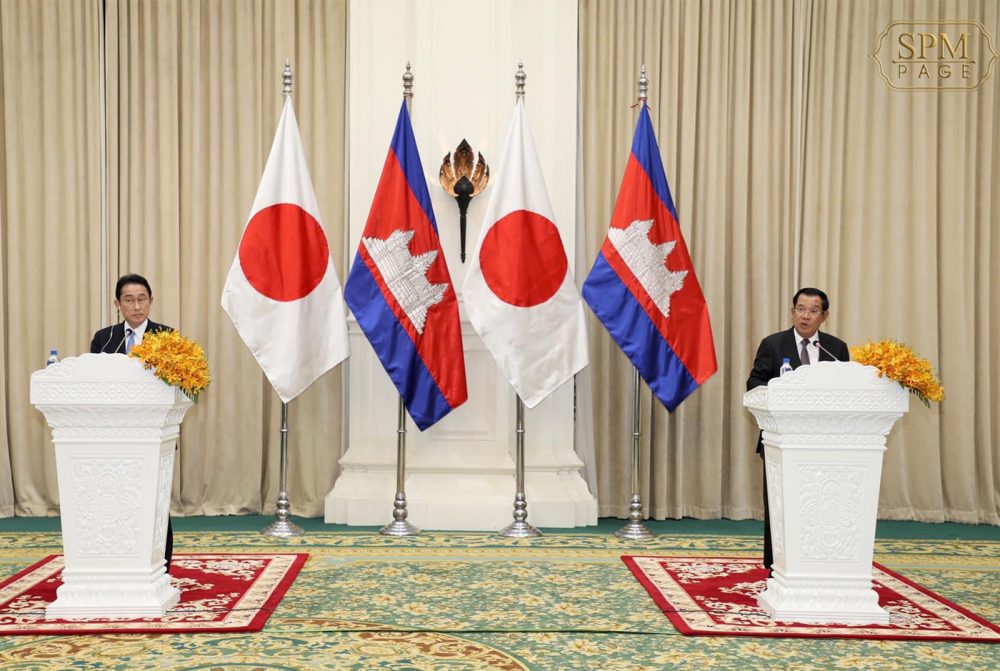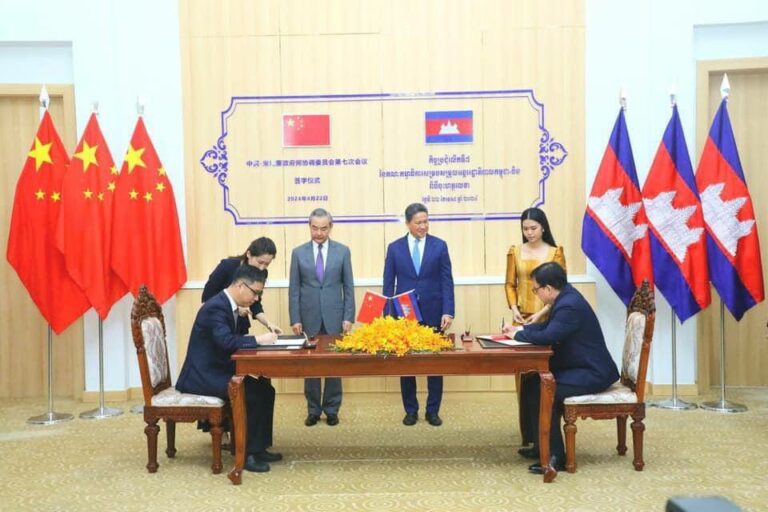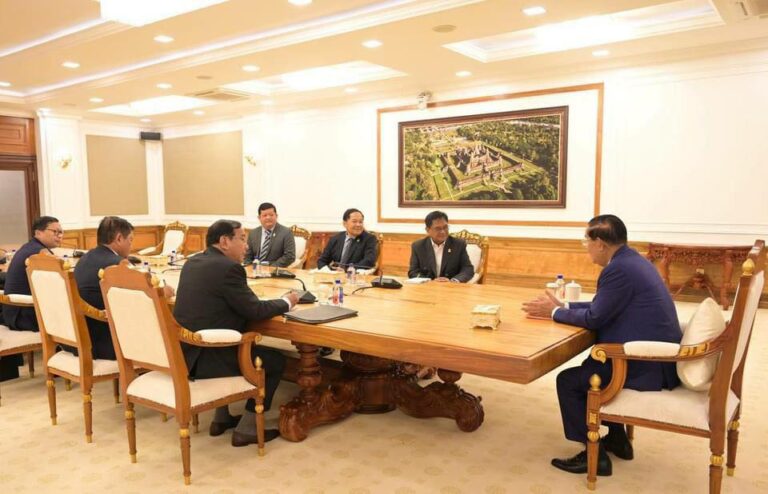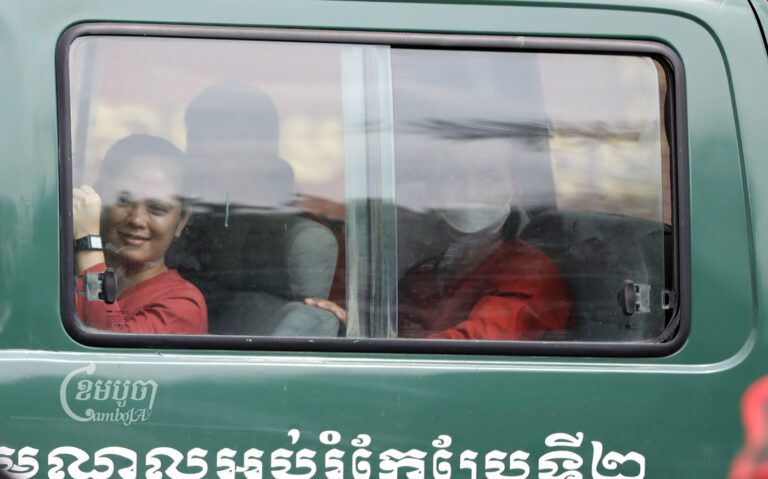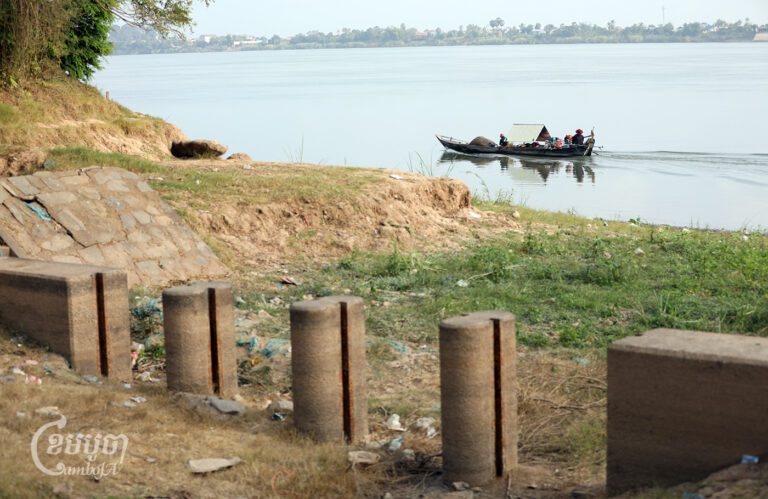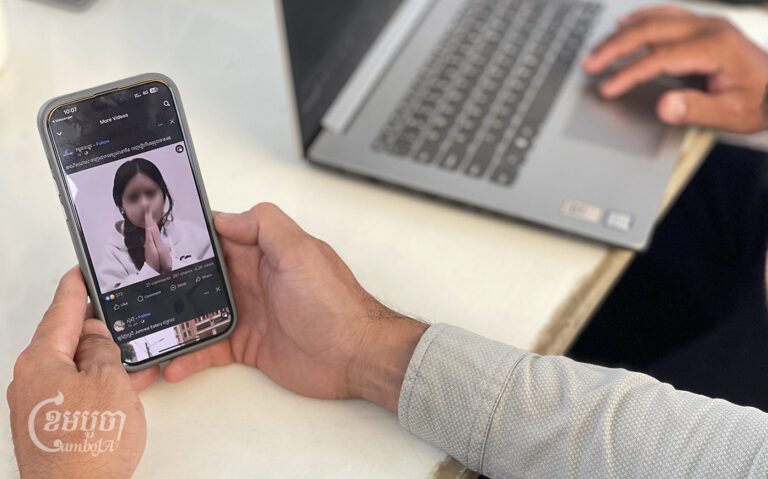On Sunday, visiting Japanese Prime Minister Fumio Kishida reiterated his support for democracy and rule of law, touching on the subject once again after raising the issue last month with Hun Manet.
“Japan wants to see elections in a way that reflects diverse voices from Cambodian people through promotion of dialogue between the government and civil society, the enhancement of governance through civic engagement, and the legal technical assistance,” Kishida said.
A joint statement from Kishida and Prime Minister Hun Sen issued after their meeting pledged to boost their two countries’ relationship, both on a bilateral level and in regional and global cooperation. Kishida also stressed the potential for a closer security partnership between the nations, a nudge that comes as Cambodian analysts see a broader Japanese outreach to balance China’s regional influence.
Japan already provides ample social and infrastructure development support for Cambodia, the latter of which includes roads and bridges, seaports, electricity and water treatment facilities.
According to the joint statement, Cambodia and Japan have pledged to make the kingdom’s deep seaport in Sihanoukville a more prominent regional and international hub. Besides the deep seaport, infrastructure projects in Sihanoukville are currently dominated by Chinese business and investment.
Hun Sen spoke favorably of the visit with Kishida in a press conference after their meeting.
“We continue to enhance the strategic partnership between the two countries and exchange views on regional and international issues,” he said. “We are pleased with the progress [bilateral relations] and recognize that this relationship is at an all-time high and have agreed to boost the bilateral relations under the strategic partnership to a new level.”
According to Hun Sen, bilateral trade between Cambodia and Japan remained stable at more than $2 billion, even during the COVID-19 pandemic.
Political analyst Meas Nee said relations between Cambodia and Japan are based on perceived economic benefits and geopolitics.
“If we look at the economic activities in ASEAN countries, most are dominated by Japanese investment, except Cambodia which is dominated by the Chinese. This shows the widened gap between Japan and China,” he said. “On an economic level, Japan is attempting to balance China’s influence in Cambodia.”
Nee said that on the political level, Japan is taking a middle position, rather than exerting pressure.
“Since Cambodia entered the political crisis, Japan did not join in putting pressure on Cambodia,” he said. “However, Japan still reminds Cambodia to go the right direction in human rights, respect and democracy.”
Japan and Cambodia have also pledged to work together on regional issues, ranging from the Myanmar crisis and the Russian invasion of Ukraine, to tensions on the Korean peninsula and in the South China sea. While Cambodia serves as the rotational ASEAN chairman, the kingdom is tasked with overseeing the bloc’s response to such developments.
Cambodia recently lent its support to a UN resolution opposing Russia’s invasion of Ukraine. Closer to home, Foreign Minister Prak Sokhonn, as the ASEAN bloc’s special envoy to Myanmar, is currently leading a delegation on a three-day, March 21-23 working visit to the conflict-stricken country.
The joint statement for Kishida’s visit to Cambodia also reaffirmed the importance of sustaining peace and freedom of navigation in and over the South China Sea, as well as self-restraint and non-militarization in accordance with international law.
They also emphasized the importance of urging countries concerned to avoid unilateral actions that would increase tensions or complicate the situation in the South China Sea.
But as Japan seeks to counter Chinese influence, Cambodia maintains a balance of its own.
On March 18, Hun Sen had a phone conversation with Chinese President Xi Jinping, focusing on bilateral relations between their two countries, as well as regional and global issues.
And as the China-Cambodia Free Trade Agreement enters into force, Xi has promised to increase rice imports from Cambodia, as well as other agricultural products, to help reduce poverty in the kingdom.
Hun Sen has previously defended Cambodian reliance on China by asking in a public address that “if not depending on China, who should Cambodia rely on?”
The drift further into Chinese orbit has threatened to strain other ties. ASEAN partners have in the past questioned Cambodia’s willingness to represent the interests of the bloc – and not those of China – in the South China Sea dispute. The US has also routinely accused the kingdom of breaking from its own constitution to allow China to construct a military base within the Ream naval base, a claim the Cambodian government has denied.
Ear Sophal, a US-based political commentator and associate professor at Arizona State University, believes the Cambodian government is pleased that Kishida had previously welcomed the visit from Hun Manet, who has been designated as his father’s successor.
“It would seem this is Japan’s way to create goodwill, and this has already borne fruit in the joint declaration issued by Cambodia and Japan following talks,” Sophal said.
He added that, since Hun Sen had also just spoken with Xi Jinping, this suggests Cambodia does not see any incompatibility between its foreign policy toward Japan and China.
Sophal said Cambodia can contribute to solving regional and global issues by advocating for peace, territorial integrity, and sovereignty. At the same time, he said the government should not destroy its own democracy, shrinking the space for freedom and abusing the human rights of its own people.
“Without being a democracy, asking the Burmese Generals to respect democracy is simply not credible,” he said. “On the South China Sea, supporting only China’s position is not playing honest broker as well.”
However, Sophal said the Japanese delegation’s promotion of human rights and democracy in the kingdom should be taken with some skepticism.
“Honestly, Japan is always supporting Cambodia’s position to get rid of the UN Human Rights office in Cambodia, so it’s not as if Japan is an honest broker either,” he said.


